|
|
|
Sort Order |
|
|
|
Items / Page
|
|
|
|
|
|
|
| Srl | Item |
| 1 |
ID:
151256
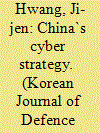

|
|
|
|
|
| Summary/Abstract |
People`s War was originally considered a military concept suited to the traditional battlefields of mainland China, involving the mobilization of the massive populace in order for the inferior forces of the Chinese Communist Party (CCP) to defeat a superior adversary. However, in the past few decades, this tradition of People`s War has not merely been useful for developing military strategy, but has also been applicable to many other national developments, such as economics, social modernization, and government and public affairs, as a vital “behind-the-scenes” guideline to garner a certain consensus from the Chinese people in order to carry out the policies that the Chinese government wishes to implement. In particular, this tradition can be perfectly applied to China`s cyber warfare in the digital age, as the strategic value of cyberspace has removed the restriction of traditional geographic barriers and borders between states. Thus, the potential masses of Chinese “cyber warriors” can carry out attacks geographically unhindered in cyberspace. It is thus of global significance that China, a rising world superpower, is currently expending great effort on developing warfare in cyberspace. This paper investigates how China`s fundamental strategic doctrine, People`s War―which is traditionally based upon geographical battlegrounds―can be integrated into the concept of cyberspace as a potential battlefield. Meanwhile, some interviews were also conducted in Taiwan in order to further dissect some thematic propositions merged from documentary resources.
|
|
|
|
|
|
|
|
|
|
|
|
|
|
|
|
| 2 |
ID:
133611
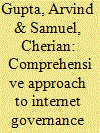

|
|
|
|
|
| Publication |
2014.
|
| Summary/Abstract |
The pressing issues around cyberspace revolve around internet governance, cybersecurity and drawing up rules of the road for the new domain of cyberwar. While each of these is at a different stage in its evolution cycle, cyberspace itself is facing a watershed moment as insecurities mount. The fragmentation of cyberspace seems inevitable unless there is accelerated movement on resolving the fundamental issues of internet governance and cybersecurity that have been hanging fire for well over a decade.
|
|
|
|
|
|
|
|
|
|
|
|
|
|
|
|
| 3 |
ID:
160360
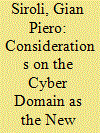

|
|
|
|
|
| Summary/Abstract |
The convergence of telecommunication and computer technologies that has evolved in the field of information and communication technologies (ICT) in the last two decades has had very important effects on new war technologies and the ongoing process of battlefield digitisation. The Stuxnet worm, uncovered in 2010 and responsible for the sabotaging of a uranium enrichment infrastructure in Iran, is a clear example of a digital weapon. The incident shows what is meant by cyber war and what the particular features of this new warfare dimension are compared to the conventional domains of land, sea, air and space, with relevance both at the operational and strategic levels. But cyberspace also extends to the semantic level, within the complimentary field of information warfare involving the content of messages flowing through the Internet for the purposes of propaganda, information, disinformation, consensus building, etc. The overall cyber warfare domain needs to be put into perspective internationally as many countries are developing strong cyber capabilities and an ‘arms race’ is already taking place, showing that these technologies can potentially be used to undermine international stability and security. What is needed is a public debate on the topic and its impact on global stability, and some kind of regulation or international agreement on this new warfare domain, including an approach involving confidence building measures (CBMs).
|
|
|
|
|
|
|
|
|
|
|
|
|
|
|
|
| 4 |
ID:
133772
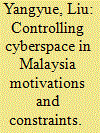

|
|
|
|
|
| Publication |
2014.
|
| Summary/Abstract |
This paper examines how Internet control strategy in Malaysia was shaped by particular forms of online political contention and by a well-coordinated online civil society. It also traces the shift of this strategy to more covert means in the 2011 Sarawak State election.
|
|
|
|
|
|
|
|
|
|
|
|
|
|
|
|
| 5 |
ID:
129570
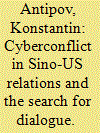

|
|
|
|
|
| Publication |
2014.
|
| Summary/Abstract |
The unprecedented escalation of conflict between China and the United States in cyberspace signals a definite crisis in Chinese-American relations. At the same time, the results from informal meetings between, Xi Jinping and Barak Obama in California on June8-9, 2013 show that the United States and China could possible move toward a new stage in their relations in the field of security.
|
|
|
|
|
|
|
|
|
|
|
|
|
|
|
|
| 6 |
ID:
133609
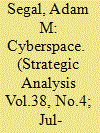

|
|
|
|
|
| Publication |
2014.
|
| Summary/Abstract |
In June 2013, President Obama met with President Xi Jinping at Sunnylands, California. The meeting was seen as a chance for the two leaders to get to know each other in a relatively informal setting so they could address the growing mistrust between their countries. While maritime disputes, trade tensions and differences over how to contain the North Korean and Iranian nuclear programmes were high on the agenda, cyber security-in particular Chinese cyber espionage-was the defining issue of this unusual summit. For the US, the meeting between the two presidents was the culmination of a long campaign to pressure Beijing to reduce the scope and scale of Chinese cyber attacks on the United States.
|
|
|
|
|
|
|
|
|
|
|
|
|
|
|
|
| 7 |
ID:
133610
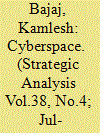

|
|
|
|
|
| Publication |
2014.
|
| Summary/Abstract |
Just as the world was beginning to understand the various dimensions of cyberspace in general, and internet governance in particular, it received the rude shock of the Snowden revelations about the global surveillance carried out by the United States National Security Agency (NSA) in the name of counterterrorism. All kinds of electronic communications of US citizens and non-citizens alike were monitored. Phone tapping and electronic interception were part of this huge operation to collect a haystack of data in the hope of detecting terrorist links to protect national security. The stories that are emerging from the NSA documents made available by Edward Snowden since June 2013 in the Guardian, the New York Times, Der Spiegel and the Washington Post continue to surprise, enrage or shame people depending upon the nation or group that they belong to. The whole world, including those who work for spy agencies, is surprised at the enormity of the scale of surveillance.
|
|
|
|
|
|
|
|
|
|
|
|
|
|
|
|
| 8 |
ID:
130920
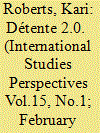

|
|
|
|
|
| Publication |
2014.
|
| Summary/Abstract |
This paper asks whether the recent "reset" in Russia-US relations parallels the Cold War reprieve from East to West tensions during Détente. The author considers the enthusiasm for this reset shared by Presidents Medvedev and Obama and acknowledges the benefits accrued for Russia as a result of better relations with the United States. In so doing, the paper argues that the Medvedev-Obama reset is not the result of a convergence of liberal-minded principles shared by the leadership, due in large part to the absence of a meaningful commitment on the part of Medvedev to bring about meaningful liberal reforms in Russia. In fact, the reset seems more the result of a desire by both leaders to shed past ideological disagreements in favor of a more pragmatic approach to relations, based upon mutual benefit. The paper then concludes that the current reset is not a temporary warming of relations akin to a second-generation détente because there was no "new Cold War" to abate. The paper contributes to the growing body of opinion that acknowledges a need for analysts and practitioners to search for a better lens through which to view Russia-US relations than the Cold War prism that persistently frames our analysis.
|
|
|
|
|
|
|
|
|
|
|
|
|
|
|
|
| 9 |
ID:
125328
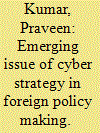

|
|
|
|
|
| Publication |
2013.
|
| Summary/Abstract |
There have been various cases like that of alleged attacks on South Korean cyber interests (banks) by North Korea, joint targeting of the speculated Iran's nuclear programme by USA and Israel (Stuxnet), Chinese targeting of the networks of India (DRDO computers), USA (as revealed by Mediant Inc.), other European nations and businesses to serve its interests, and Russian targeting of the Estonian computer networks, among others, which indicate to the fact that various nation-states on this arena consider their interests similar to those of the real world.
|
|
|
|
|
|
|
|
|
|
|
|
|
|
|
|
| 10 |
ID:
129448
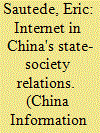

|
|
|
|
|
| Publication |
2013.
|
| Summary/Abstract |
This article explores how state and society relations have been affected by the development of information technology in China over the past 20 years. It argues that despite all the transformative changes that such technology has helped bring about, 'benefits' have to be weighed in terms of both empowerment of society and strengthening of state capacity. Ultimately, the digital challenge has not translated into a weakening of the authoritarian state, and this can be explained by the very nature of the party-state in China and how it has managed to make use of communication tools that prove to be both constructive and divisive.
|
|
|
|
|
|
|
|
|
|
|
|
|
|
|
|
| 11 |
ID:
165280
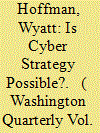

|
|
|
| 12 |
ID:
132805
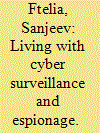

|
|
|
|
|
| Publication |
2014.
|
| Summary/Abstract |
Surveillance and espionage have existed for time immemorial. While they were always a part of any military campaign and study, private lives of ordinary citizens were generally not much affected by such activities. Things are not the same anymore. With the internet invading into our lives like never before, we today live under constant surveillance of multiple agencies like the government, your employer and perhaps your friends and neighbours. While a lot has been written and spoken about surveillance using land, sea, air and space, not much is heard about the surveillance using the fifth domain - the cyber space.
|
|
|
|
|
|
|
|
|
|
|
|
|
|
|
|
| 13 |
ID:
124371
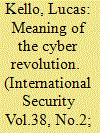

|
|
|
|
|
| Publication |
2013.
|
| Summary/Abstract |
Security policy in the information age faces formidable challenges. Chief among these is to evaluate correctly the impact of cyberweapons on strategy: Does the new technology require
a revolution in how scholars and policymakers think about force and conºict?1 Practitioners confront a predicament in addressing this question: the cyber revolution gives rise to novel threats and opportunities requiring immediate policy responses; yet understanding its nature and its consequences for security is a slow learning process. Interpretation of cyber phenomena involves analysis of a new body of experience that existing theories may be unable to clarify. It presupposes, moreover, a technical understanding of a transforming technology, whose implications require time to master because of its scientific complexity.
|
|
|
|
|
|
|
|
|
|
|
|
|
|
|
|
| 14 |
ID:
133608
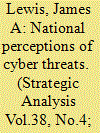

|
|
|
|
|
| Publication |
2014.
|
| Summary/Abstract |
The issue of cybersecurity as an issue for international security has captured the attention of policy makers around the world. A 2011 United Nations (UN) assessment found that only 68 of the 193 UN member states had cybersecurity programmes. By 2012, this had increased to 114 countries. Of the nations with cybersecurity programmes, roughly 40 have publicly identified cybersecurity as a military concern in national military strategies or defence white papers.
|
|
|
|
|
|
|
|
|
|
|
|
|
|
|
|
| 15 |
ID:
176934
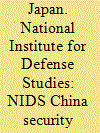

|
|
|
|
|
| Publication |
Japan, NIDS, 2020.
|
| Description |
viii, 102p.pbk
|
| Standard Number |
9784864820882
|
|
|
|
|
|
|
|
|
|
|
|
Copies: C:1/I:0,R:0,Q:0
Circulation
| Accession# | Call# | Current Location | Status | Policy | Location |
| 059987 | 355.423/JAP 059987 | Main | On Shelf | General | |
|
|
|
|
| 16 |
ID:
107390
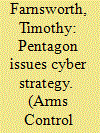

|
|
|
|
|
| Publication |
2011.
|
| Summary/Abstract |
In the wake of a rising number of cyberattacks on computer networks worldwide, the U.S. Department of Defense on July 14 released an unclassified strategy for defending against and responding to attacks on U.S. computer networks and infrastructure.
|
|
|
|
|
|
|
|
|
|
|
|
|
|
|
|
| 17 |
ID:
177756
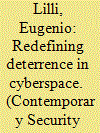

|
|
|
|
|
| Summary/Abstract |
This article explores the nature and the desirability of private sector contribution to national strategies of cyber deterrence. The article starts by developing a variation of the concept of cyber deterrence, called RCDC deterrence, which is simultaneously restrictive, comprehensive, dynamic, and complemental. Second, it applies RCDC deterrence to identify and analyze specific areas of cyber deterrence that can benefit the most from private sector contribution. Third, the article cautions about the potential security, legal, and moral issues that could arise from such private contributions. Instead of offering definitive answers on these complex issues, the article ends by suggesting avenues for further research. The ultimate objective is to assist decision-makers in designing policies and regulations aimed at maximizing the benefits of public–private cooperation in cyber deterrence while mitigating its potential downsides.
|
|
|
|
|
|
|
|
|
|
|
|
|
|
|
|
| 18 |
ID:
130030
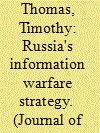

|
|
|
|
|
| Publication |
2014.
|
| Summary/Abstract |
This article discusses new developments in Russia's information and cyber warfare concepts. It updates information based on old paradigms and introduces several new developments that are influencing the current paradigm. It examines the potential shape of Russia's cyber strategy and offers a prediction as to how they might 'cyber cope' in future conflict.
|
|
|
|
|
|
|
|
|
|
|
|
|
|
|
|
| 19 |
ID:
129374
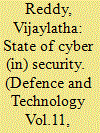

|
|
|
|
|
| Publication |
2012.
|
| Summary/Abstract |
Could the Indian Territorial Army know more for giving honorary commission to cricket players and movie starts really transform into the cyber arms that India desperately needs? Are our cyber laws adequate? What about the police and other enforcement agencies are they anywhere close to what we can cyber literacy?
The primary objective of creating a permanent mechanism for public private partnership (PPP) in the area of cyber security is to eventually establish India as the global hub for cyber security services products and manpower.
|
|
|
|
|
|
|
|
|
|
|
|
|
|
|
|
| 20 |
ID:
127864
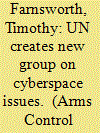

|
|
|
|
|
| Publication |
2013.
|
| Summary/Abstract |
The UN General Assembly First Committee in October and November adopted resolutions creating a new group of governmental experts to follow up on an earlier study that reflected a consensus within a 15-member group of experts on some of the most contentious issues of state behavior in cyberspace. That study, issued in June, determined that current international law, including the law of armed conflict, applies to state behavior in cyberspace. (See ACT, July/August 2013.) The United States and many of its allies had long held that position, but some key countries had argued against it.
|
|
|
|
|
|
|
|
|
|
|
|
|
|
|
|
|
|
|
|
|